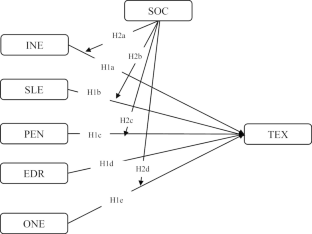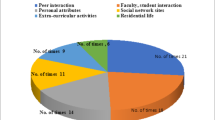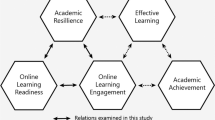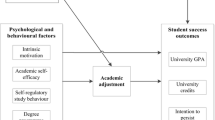Abstract
Universities today are facing challenges regarding students’ persistence and success especially among first year students who converge from diverse socioeconomic and cultural backgrounds and anticipate a smooth academic and social adjustment to the university setting. However, contextual and individual factors play important role in the academic and social adjustment of first year students. In order to provide an empirical explanation to this phenomenon, the current study examines the moderating effect of social adjustments on the relationship between academic adjustment and the transition experiences of first year students in a multi-campus university in South Africa. Data was gathered by way of a survey from a sample of 1538 students while the analysis was performed using bivariate correlation and hierarchical regression analysis. Results showed that while all the five academic adjustment factors evaluated demonstrated positive and significant relationship with the transition experiences of students, intellectual engagement and online engagement served as the strongest predictors of the transition experiences of first year students. The study further revealed that social adjustment significantly moderate the relationship between three academic adjustment factors (student-lecturer engagement, peer engagement and online learning) and the transition experiences of first year students. Therefore, through students’ interaction with their peers and staff as well as their involvement in social and cultural activities, they enhance their academic adjustment and transition experiences. We highlight the implications of our findings in relation to theory and practice and propose ways that universities could develop structures and policies to enhance the transition experiences of first year students.





Similar content being viewed by others
References
Aiken, L. S., & West, S. G. (1991). Multiple regression: testing and interpreting interactions. Newbury Park, CA: Sage.
Anderson, J. C., & Gerbing, D. W. (1988). Structural equation modeling in practice: a review and recommended two-step approach. Psychological bulletin, 103(3), 411.
Baik, C., Larcombe, W., & Brooker, A. (2019). How universities can enhance student mental wellbeing: the student perspective. Higher Education Research & Development, 38(4), 674–687.
Baron, P., & Corbin, L. (2012). Student engagement: Rhetoric and reality. Higher Education Research & Development, 31(6), 759–772.
Bean, J., & Eaton, S. B. (2001). The psychology underlying successful retention practices. Journal of College Student Retention: Research Theory & Practice, 3(1), 73–89.
Boulter, L. (2002). Self-concept as a predictor of college freshmen academic adjustment. College Student Journal, 36(2), 234–246.
Bovill, C., & Felten, P. (2016). Cultivating student–staff partnerships through research and practice. International Journal for Academic Development, 21(1), 1–3.
Briggs, A. R. J., Clark, J., & Hall, I. (2012). Building bridges: understanding student transition to university. Quality in Higher Education, 18(1), 3–21. https://doi.org/10.1080/13538322.2011.614468.
Bye, L. A., Muller, F., & Oprescu, F. (2020). The impact of social capital on student wellbeing and university life satisfaction: a semester-long repeated measures study. Higher Education Research & Development, 39(5), 898–912.
Cloete, N. (2014). The south african higher education system: performance and policy. Studies in Higher Education, 39:8, 1355–1368.
Coertjens, L., Brahm, T., Trautwein, C., & Lindblom-Ylänne, S. (2017). Students’ transition into higher education from an international perspective. Higher Education, 73(3), 357–369.
Collings, R., Swanson, V., & Watkins, R. (2016). Peer mentoring during the transition to university: assessing the usage of a formal scheme within the UK. Studies in Higher Education, 41(11), 1995–2010.
Daniels, J., & Brooker, J. (2014). Student identity development in higher education: implications for graduate attributes and work-readiness. Educational research, 56(1), 65–76.
Dawson, J. F. (2014). Moderation in management research: what, why, when, and how. Journal of business and psychology, 29(1), 1–19.
Denny, E. (2021). Student views on transition to higher education in Ireland: Challenges, impacts and suggestions. Higher Education Quarterly, 75(1), 113–145.
DHET (Department of Higher Education and Training) (2018). Statistics on Post-School Education and Training in South Africa: 2019. Available at: https://www.dhet.gov.za/SiteAssets/Post-School%20Education%20and%20Training%20Monitor%20Report_March%202019.pdf Retrieved on 05/09/2020
DHET (Department of Higher Education and Training) (2013). White Paper on Post-School Education and Training. Pretoria: DHET. Available at: https://www.justice.gov.za/commissions/FeesHET/docs/2013-WhitePaper-Post-SchoolEducationAndTraining.pdf. Accessed on 05/09/2020.
Duque, L. C., & Weeks, J. R. (2010). Towards a model and methodology for assessing student learning outcomes and satisfaction. Quality assurance in education, 18(2), 84–105.
Faloye, S. T., Ajayi, N. A., & Raghavjee, R. (2020). Managing the Challenges of the Digital Divide Among First Year Students: A Case of UKZN. In 2020 IST-Africa Conference (IST-Africa) (pp. 1–11). May 2020, IEEE.
Farrell, O., Brunton, J., & Trevaskis, S. (2020). ‘If I had missed it I would have been the lost little sheep’: exploring student narratives on orientation to first year. Journal of Further and Higher Education, 44(7), 865–876.
Fong, C. J., Davis, C. W., Kim, Y., Kim, Y. W., Marriott, L., & Kim, S. (2017). Psychosocial factors and community college student success: a meta-analytic investigation. Review of Educational Research, 87(2), 388–424.
Fornell, C., & Larcker, D. F. (1981). Structural equation models with unobservable variables and measurement error: Algebra and statistics. Journal of Marketing Research, 18(3), 382–388.
Garrison, R. D. (2017). E-learning in the 21st century: a community of inquiry framework for research and practice (3rd ed.). New York: Routledge.
Ghedamsi, I., & Lecorre, T. (2021). Transition from high school to university calculus: a study of connection. ZDM–Mathematics Education, 53, 563–575.
Goggin, T., Rankin, S., Geerlings, P., & Taggart, A. (2016). Catching them before they fall: a vygotskian approach to transitioning students from high school to university. Higher Education Research & Development, 35(4), 698–711.
Guzmán, P., Gomez, C., G., & Santelices, M. V. (2021). Secondary students’ expectations on transition to higher education. Educational Research, 1–16. https://doi.org/10.1080/00131881.2021.1915173[Advance online publication].
Hair, J. F. Jr., Hult, G. T. M., Ringle, C., & Sarstedt, M. (2014). A primer on partial least squares structural equation modeling (. Thousand Oaks, CA: PLS-SEM) SAGE.
Hair, J. F., Anderson, R. E., Tatham, R. L., & Black, W. C. (1998). Multivariate data analysis (5th ed.). Upper Saddle River, NJ: Prentice Hall.
Hilliard, L. P., & Stewart, M. K. (2019). Time well spent: creating a community of inquiry in blended first-year writing courses. The Internet and Higher Education, 41, 11–24.
Jensen, K., & Bennett, L. (2016). Enhancing teaching and learning through dialogue: a student and staff partnership model. International Journal for Academic Development, 21(1), 41–53.
Krause, K. L., & Coates, H. (2008). Students’ engagement in First-year University. Assessment & Evaluation in Higher Education, 33(5), 493–505.
Locks, A. M., Hurtado, S., Bowman, N. A., & Oseguera, L. (2008). Extending notions of campus climate and diversity to students’ transition to college. The Review of Higher Education, 31(3), 257–285.
Marksteiner, T., Janke, S., & Dickhäuser, O. (2019). Effects of a brief psychological intervention on students’ sense of belonging and educational outcomes: the role of students’ migration and educational background. Journal of school psychology, 75, 41–57.
Mayhew, M. J., Grunwald, H. E., & Dey, E. L. (2005). Curriculum matters: creating a positive climate for diversity from the student perspective. Research in Higher Education, 46(4), 389–412.
McGhie, V. (2017). Entering university studies: identifying enabling factors for a successful transition from school to university. Higher Education, 73(3), 407–422.
Mpungose, C. B. (2020). Is moodle or WhatsApp the preferred e-learning platform at a south african university? First-year students’ experiences. Education and information technologies, 25(2), 927–941.
Pascarella, E. T., & Terenzini, P. T. (1991). How college affects students. San Francisco: Jossey-Bass.
Perander, K., Londen, M., & Holm, G. (2021). Supporting students’ transition to higher education. Journal of Applied Research in Higher Education, 13(2), 622–632.
Räisänen, M., Postareff, L., Mattsson, M., & Lindblom-Ylänne, S. (2020). Study-related exhaustion: first-year students’ use of self-regulation of learning and peer learning and perceived value of peer support. Active Learning in Higher Education, 21(3), 173–188.
Samad, S., Nilashi, M., & Ibrahim, O. (2019). The impact of social networking sites on students’ social wellbeing and academic performance. Education and Information Technologies, 24(3), 2081–2094.
Schutze, H., & Bartyn, J. (2020). Development, implementation and students’ perceptions of the effectiveness of an interdisciplinary for-credit subject to help students transition to university. Student Success, 11(2), 1–13.
Shih, T. H., & Fan, X. (2009). Comparing response rates in e-mail and paper surveys: a meta-analysis. Educational Research Review, 4(1), 26–40.
Soudien, C. (2008). Report of the ministerial committee on transformation and social cohesion and the elimination of discrimination in public higher education institutions. Available at: https://ukzn.ac.za/wp-content/miscFiles/publications/ReportonHEandTransformation.pdf. Accessed on June 10, 2021.
Thomas, L., Orme, E., & Kerrigan, F. (2020). Student loneliness: the role of social media through life transitions. Computers & Education, 146, 103754.
Tinto, V. (1975). Dropout from higher education: a theoretical synthesis of recent research. Review of Educational Research, 45, 89–125.
van der Zanden, P. J., Denessen, E., Cillessen, A. H., & Meijer, P. C. (2019). Patterns of success: first-year student success in multiple domains. Studies in Higher Education, 44(11), 2081–2095.
Walsh, C., Larsen, C., & Parry, D. (2009). Academic tutors at the frontline of student support in a cohort of students succeeding in higher education. Educational Studies, 35(4), 405–424.
Wilson-Strydom, M. (2010). Traversing the chasm from school to university in South Africa: a student perspective. Tertiary education and Management, 16(4), 313–325.
Wong, B., & Chiu, Y. L. T. (2019). Let me entertain you: the ambivalent role of university lecturers as educators and performers. Educational Review, 71(2), 218–233.
Xerri, M. J., Radford, K., & Shacklock, K. (2018). Student engagement in academic activities: a social support perspective. Higher education, 75(4), 589–605.
Author information
Authors and Affiliations
Corresponding author
Ethics declarations
Conflict of interest
The authors declare that they have no conflict of interest.
Additional information
Publisher’s Note
Springer Nature remains neutral with regard to jurisdictional claims in published maps and institutional affiliations.
Electronic supplementary material
Below is the link to the electronic supplementary material.
Rights and permissions
Springer Nature or its licensor (e.g. a society or other partner) holds exclusive rights to this article under a publishing agreement with the author(s) or other rightsholder(s); author self-archiving of the accepted manuscript version of this article is solely governed by the terms of such publishing agreement and applicable law.
About this article
Cite this article
Owusu-Agyeman, Y., Mugume, T. Academic adjustment of first year students and their transition experiences: The moderating effect of social adjustment. Tert Educ Manag 29, 189–209 (2023). https://doi.org/10.1007/s11233-023-09120-3
Received:
Accepted:
Published:
Issue Date:
DOI: https://doi.org/10.1007/s11233-023-09120-3




